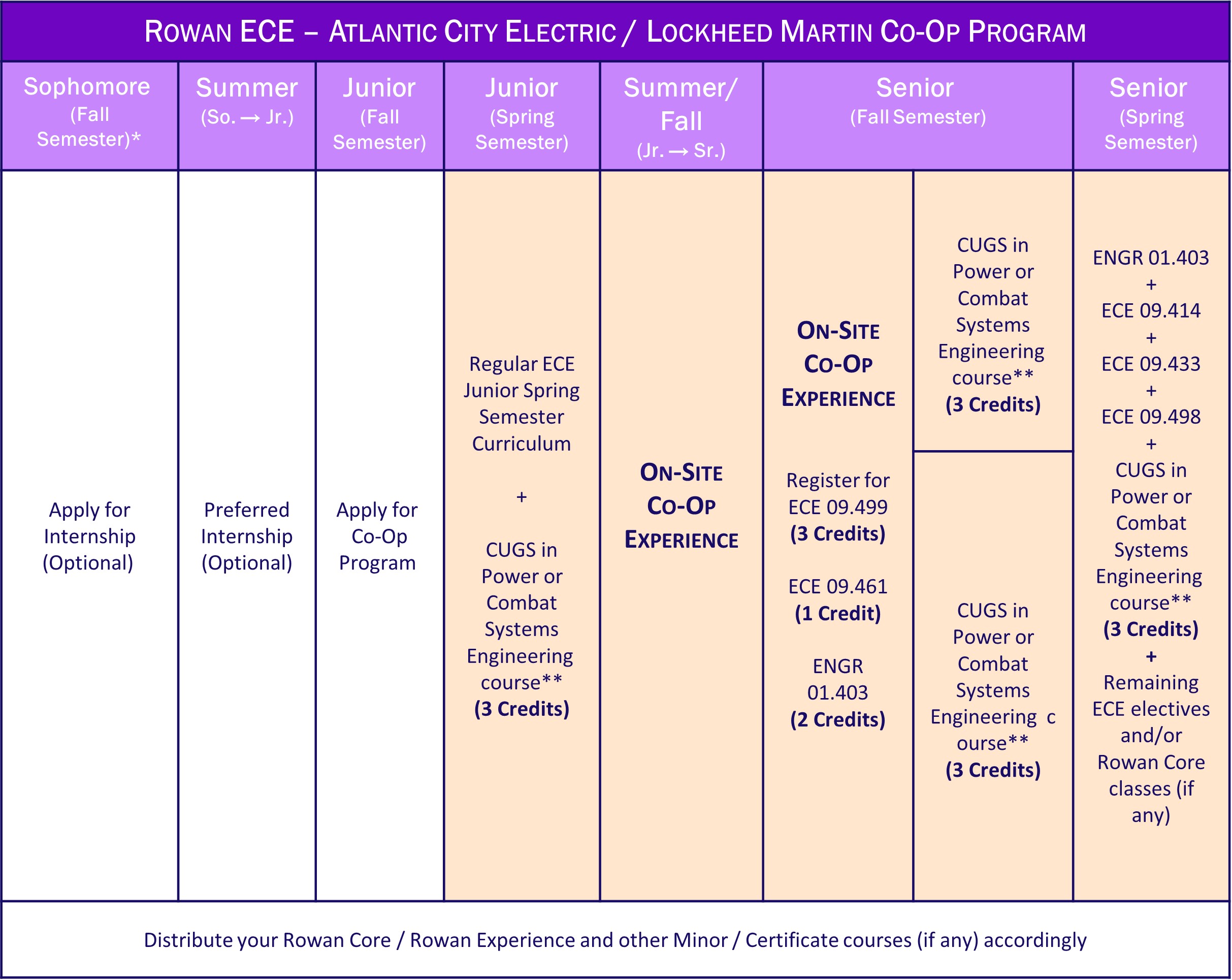Co-op Programs
Co-op Programs
Co-op Programs in ECE
Rowan ECE offers optional 6-9 month co-op programs while still allowing you to graduate in four years.
What:
The ECE co-op program is optional and open to qualified and interested students. The co-op program allows you to work full-time at one of our industrial partners during the summer between your junior and senior years, and continue for the Fall semester of your senior year. Currently, we have five co-op programs with Atlantic City Electric (Atlantic City, NJ), Lockheed Martin (Moorestown, NJ), NAVSEA (Philadelphia, PA), Inductotherm Corp., and Consarc Corp (both in Rancocas, NJ), and Concord Engineering (Vorhees, NJ or Philadelphia, PA). Students participating in one of these programs (and only these programs) receive up to 6 credits for the co-op work done (see below). At this time, only these co-op experiences qualify for credit, but we are working to establish partnerships with other companies to expand our co-op offerings. A legal agreement establishing the fundamental guidelines for the co-op between Rowan University and the company offering it is required for Rowan University to award credit.
When:
The co-op program experience starts during the summer between your Junior and Senior years, and continues throughout the Fall semester of your senior year (as that is when you have the most knowledge, skills, and experience). In order to be eligible for the co-op program, you must complete all required junior-level classes before the summer in which you intent to start. Most of our partners will provide an information session, followed by interviews sometime in the Fall semester, so in most cases, you will apply during the Fall semester of your Junior year.
Curricular Overview & CUGS Integration:
There are two required ECE major courses that are normally taken in the Fall semester of the senior year: ECE 09.414 Very Large Scale Integrated Design and ECE 09.433 Electrical Communication Systems. We offer these two courses in both Fall and Spring, so co-op students can take them in the Spring semester. There are also (at least) two senior-level technical electives and other courses normally taken during the Fall semester of your senior year. By offering elective classes in the evenings during the Fall semester, allowing some Rowan Core general education classes at other times, and awarding credit for the co-op experience, we provide a path to complete your co-op and BS in ECE or BS in EET degree requirements in four years.
Note that each of these co-op programs is associated with a specific certificate program and/or additional course requirements. Students in the Lockheed Martin co-op program participate in the Certificate of Undergraduate Studies (CUGS) in Combat Systems Engineering - CSE (and take the four courses that make up the CSE CUGS). Students in the Atlantic City Electric / Exelon as well as Concord Engineering co-op programs participate in the Certificate of Undergraduate Studies (CUGS) in Power Systems Engineering - PSE (and take the four courses that make up the CSE CUGS). Students in the Inductotherm co-op follow the Power Systems Engineering (also for Consarc) or Cybersecurity Engineering CUGS, etc. Upon successful completion, students receive the respective certificate as well as their B.S. in ECE/EET degree.
Curricular specifics
- Officially apply for the co-op during the Fall semester of your Junior year. Selection is competitive and determined by the respective company. You are also eligible to apply for a summer internship in prior years. There is no credit given for internships; however, these internships provide much valuable experience and may increase your chances of getting into the co-op program (assuming that you do a good job during the internship).
- You must be on track to complete your junior-level courses to start the co-op. Note that this is different then having "junior status" based on the number of credits you have. You MUST complete your junior-level courses before you can start the co-op.
- No formal change to your course schedule until the Spring Semester of Junior Year. However, students are encouraged to take their Rowan Core general education courses earlier during their first three years to make room for the electives needed for the degree and the CUGS. If you are pursuing other CUGS or Minor programs, plan accordingly to distribute your course load.
- ECOMMS & VLSI are moved to the Spring semester of the Senior year. The change in the Senior Fall semester for EET students is currently in planning. EET Students should contact Dr. Polikar
- During the Fall of your Senior year, register for the following. You will receive a total of 6 credits for the following classes based on your co-op experience, as well as completing specific course requirements and deliverables. It is important to note that you must complete the full summer + Fall co-op, as well as the project reporting requirements (typically, the same reporting deliverables required by these courses taken by non-co-op students) to receive these credits.
- ECE 09.499 Co-op Experience in ECE, which counts towards one ECE elective (3 credits - subject to completing other CUGS / curricular requirements).
- ENGR 01.303/403 Junior/Senior Engineering Clinic (2 credits)
- ECE 09.461 Professionalism and Consulting in Engineering (1 credit)
- To receive full credit, you must submit the following
- ECE 09.499 → A report that details your co-op experience (see below). You will initially receive an IP grade for this course, which will be replaced with a regular grade during your last semester when you complete all other CUGS / curricular requirements.
- ENGR 01.403 → The report must include the cover page required for all clinic reports with the required content specified on the cover page + Impact and Professional Considerations (IPCS) statement
- ECE 09.461 → Project Approval & Evaluation form + Engineering Design & Impact Statement + Final exam (based on course content posted on Canvas)
- Take the relevant four courses in the relevant certificate program. Note that all certificates require four (4) classes to be taken, two (2) of which can be counted towards the electives required for the BS in ECE major (i.e., you can double dip on those two courses). Since ECE 09.499 counts as one elective, all co-op students effectively take one additional course beyond the required electives for the B.S. in ECE/EET degree, so long as all other CUGS/curricular requirements are met.
- Time your electives / CUGS courses carefully, starting with your junior year, so that they are completed by the end of your senior year. You will most likely take two electives during the Fall semester of your senior year while doing the co-op. Most electives are offered in the evenings so that they do not interfere with your full-time position at the co-op.
- All students in the co-op program must select their final senior clinic project from one of the ECE clinics upon returning for the Senior Spring semester. This is because engineering clinics for ECE constitute our major design experience requirement for accreditation purposes. Not all departments use clinics as their major design experience, so to ensure that you get one additional such design experience, all co-op students must choose one of the ECE projects as their final clinic experience.
Co-op Timeline & Planning Chart
The following chart summarizes the ECE Co-op program timeline and allows you to plan your curricular path.

* Rising sophomores are eligible to apply for internships. Contact the co-op partner directly for details.
** Only two of the four CUGS courses can be counted towards the ECE degree requirements
Please contact Dr. Polikar for additional details or questions.



